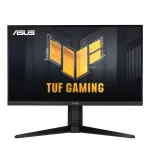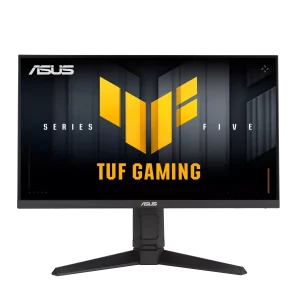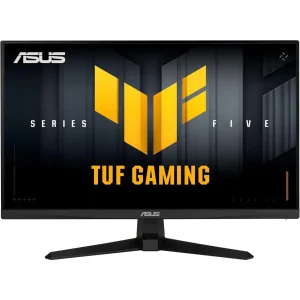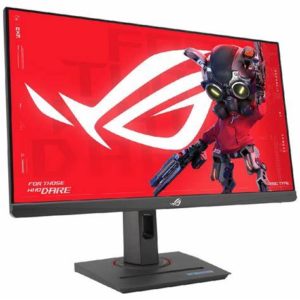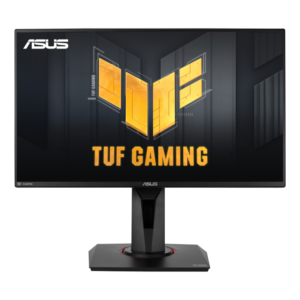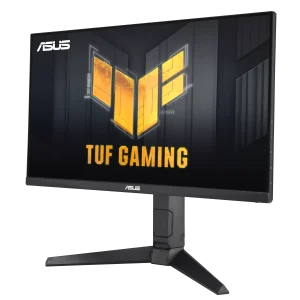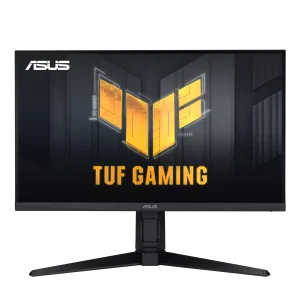
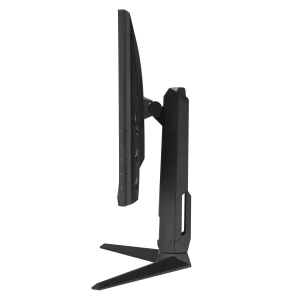
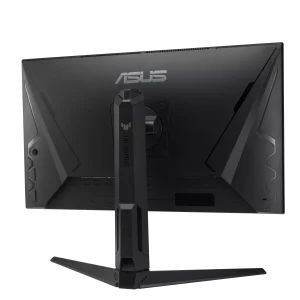
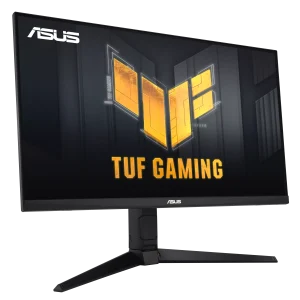
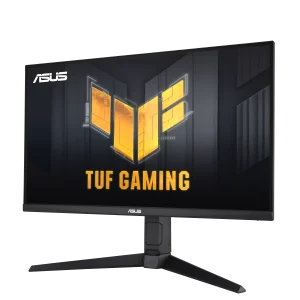





TUF Gaming VG27AQML1A Gaming Monitor – 27-inch, QHD(2560×1440), Overclock to 260Hz (native 240Hz), ELMB Sync, Freesync Premium™, 1ms (GTG),
₨ 116,640
- 27-inch QHD(2560×1440) gaming monitor with overclock to 260Hz refresh rate designed for professional gamers and immersive gameplay
- ASUS Extreme Low Motion Blur Sync (ELMB Sync) technology enables ELMB and variable-refresh-rate technologies to work simultaneously to eliminate ghosting and tearing for sharp gaming visuals with high frame rates
- FreeSync Premium, G-Sync compatible and AdaptiveSync technology delivers a seamless, tear-free gaming experience by enabling VRR (variable refresh rate) by default
- High Dynamic Range (HDR) technology with DisplayHDR™ 400 compliance supports HDR-10 format to enhance bright and dark areas
- Description
Description
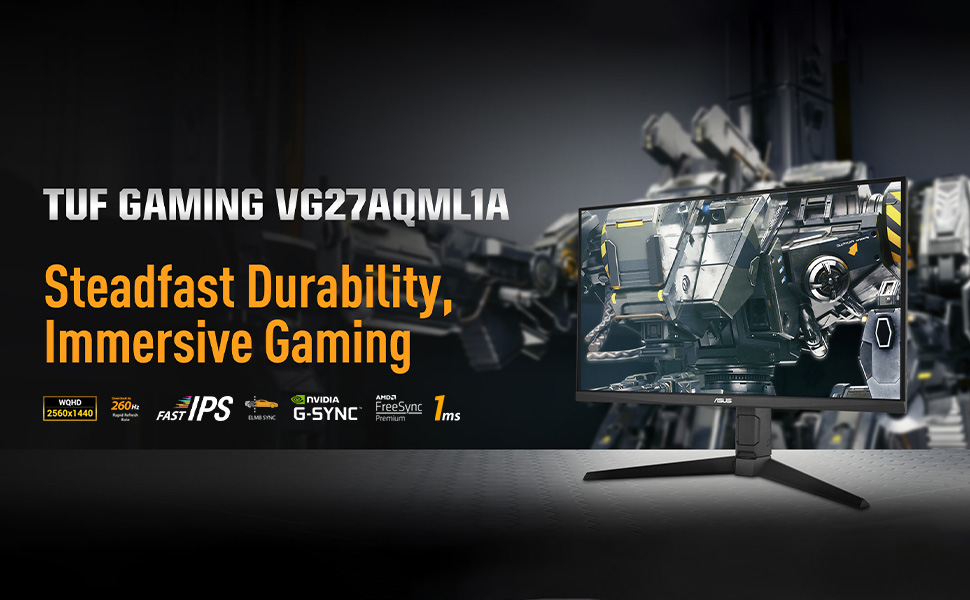
| Brand
Name of the company-manufacturer. |
Asus |
| Series
Name of the series, which the model belongs to. |
TUF Gaming |
| Model
Designation of the model. |
TUF Gaming VG27AQML1A |
| Model year
The year in which this model was announced. |
2023 |
Display
Information about the main characteristics of the display – panel, backlight, resolution, refresh rate, etc.
| Size class
Size class of the display as declared by the manufacturer. Often this is the rounded value of the actual size of the diagonal in inches. |
27 in (inches) |
| Diagonal
Approximate diagonal size of the display. If the manufacturer does not provide such information, the diagonal is calculated from the width and height of the screen. |
685.8 mm (millimeters) 68.58 cm (centimeters) 27 in (inches) 2.25 ft (feet) |
| Width
Approximate width of the display. If the manufacturer does not provide such information, the width is calculated from the diagonal and the aspect ratio. |
596.736 mm (millimeters) 59.6736 cm (centimeters) 23.4935 in (inches) 1.9578 ft (feet) |
| Height
Approximate height of the display. If the manufacturer does not provide such information, the height is calculated from the diagonal and the aspect ratio. |
335.664 mm (millimeters) 33.5664 cm (centimeters) 13.2151 in (inches) 1.1013 ft (feet) |
| Panel manufacturer
Name of the manufacturer of the display panel. |
BOE |
| Panel model
Information about the model of the panel used. |
ME270QHB-NF1 |
| Panel type
There are various panel technologies. Each has its own specific features – viewing angles, color reproduction, response time, brightness/contrast, production cost, etc. The image quality depends directly on the type of the display panel used. |
IPS |
| Panel bit depth
The most widely used panels are those with 6, 8, and 10 bits for each of the RGB components of the pixel. They provide 18-, 24-, and 30-bit color, respectively. |
8 bits |
| FRC
Frame Rate Control (FRC) is a method, which allows the pixels to show more color tones. With quick cyclic switching between different color tones, an illusion for a new intermediate color tone is created. For example, by using FRC, a 6-bit display panel is able to show 16.7 millioin colors, which are typical for 8-bit display panels, and not the standard 262200 colors, instead. There are different FRC algorithms. |
No |
| Colors
The maximum number of colors, which the display is able to reproduce, depends on the type of the panel in use and color enhancing technologies like FRC. |
16777216 colors 24 bits |
| Aspect ratio
The ratio between the horizontal and the vertical side of the display. Some of the standard and widely used aspect ratios are 4:3, 5:4, 16:9 and 16:10. |
1.778:1 16:9 |
| Resolution
Information about the number of pixels on the horizontal and vertical side of the screen. A higher resolution allows the display of a more detailed and of higher quality image. |
2560 x 1440 pixels Quad HD (QHD) / 1440p |
| Pixel pitch
The pixel pitch shows the distance from the centers of two neighboring pixels. In displays, which have a native resolution (the TFT ones, for example), the pixel pitch depends on the resolution and the size of the screen. |
0.233 mm (millimeters) 0.0233 cm (centimeters) 0.0092 in (inches) 0.0008 ft (feet) |
| Pixel density
Information of the number of pixels in a unit of length. With the decrease of the display size and the increase of its resolution, the pixel density increases. |
109 ppi (pixels per inch) 42 ppcm (pixels per centimeter) |
| Display area
The percentage of the approximate area, taken by the active part of the screen, to the total front area. |
88.88 % (percent) |
| Backlight
The backlight is the source of light of the LCD display panels. The type of backlight determines the image quality and the color space of the display. There are various backlights such as CCFL, LED, WLED, RGB-LED, and etc. |
W-LED |
| sRGB
sRGB is a color space, developed jointly by Hewlett-Packard and Microsoft in 1996. It is used in different devices such as printers, displays, TV sets, cameras, etc. The sRGB color space covers about 72% of the NTSC color space. |
100 % (percent) |
| DCI P3
DCI P3 is a color space, introduced in 2007 by the SMPTE. It is used in digital cinema and has a much wider gamut than the sRGB. |
94 % (percent) |
| Brightness
Information about the brightness of the screen. It is measured in candela per square metre (cd/m²). |
400 cd/m² (candela per square meter) |
| Static contrast
The static contrast shows the ratio between the brightest and the darkest color, which the display can reproduce simultaneously, for example, within one and the same frame/scene. |
1000 : 1 |
| Dynamic contrast
The dynamic contrast shows the ratio between the brightest and the darkest color, which the display can reproduce over time, for example, in the course of playing a video. |
100000000 : 1 |
| HDR
HDR expands the contrast ratio (peak luminance and minimal black levels) and color palette to achieve more details across the whole image – from the darkest parts to the brightest ones, which results in more realistic and life-like image. |
DisplayHDR 400 HDR10 |
| Horizontal viewing angle
Information about the maximum horizontal viewing angle, within which the image on the screen is of acceptable quality. |
178 ° (degrees) |
| Vertical viewing angle
Information about the maximum vertical viewing angle, within which the image on the screen is of acceptable quality. |
178 ° (degrees) |
| Minimum response time
Information about the minimum amount of time, in which the pixels change from one color to another. Very often the manufacturer provides the response time for transition from grey-to-grey (G2G). |
1 ms (milliseconds) 0.0010 s (seconds) |
| Coating
Information about the type of coating of the display. There are different types of matte and glossy coatings, each of which has its own advantages and drawbacks. |
Anti-glare/Matte |
| 8-bit+FRC supported at a lower refresh rate |



